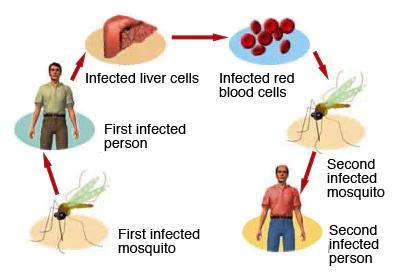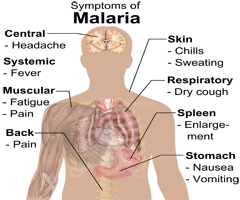ABOUT THE DISEASE
Malaria is a life-threatening mosquito-borne blood disease caused by a Plasmodium parasite. Only the female Anopheles mosquito can transmit malaria to humans. That means the vector is the female anopheline mosquito, the disease-causing organism is the malaria parasite – Plasmodium and the host is Human body.
Once an infected female Anopheles mosquito bites a human host, it infects the body, as Plasmodium parasite enters the bloodstream and lays dormant within the liver. The human host will have no symptoms of the disease for 7-10 days on an average. But the parasite begins to multiply in the host`s liver during this time. These are then released into the bloodstream to infect and destroy red blood cells.
Some malaria parasites remain in the liver and are not released until later, resulting in recurrence.
An unaffected mosquito becomes infected, as it feeds on an infected individual. Thus restarting the cycle. The successful development of the parasite within the mosquito depends on several factors like humidity and ambient temperatures.

SYMPTOMS
Most symptoms resemble those of flu, but, without treatment, the effects can sometimes be long-term and fatal.
Its symptoms can be classified into two categories: Uncomplicated and Severe malaria.
Uncomplicated malaria is diagnosed when symptoms are present, but there are no clinical or laboratory signs to indicate the severity or vital organ dysfunction. Individuals suffering from this form, can eventually develop severe malaria if the disease is left untreated.
Severe malaria is defined by clinical or laboratory evidence of vital organ dysfunction. This form has the capacity to be fatal if left untreated.
A general overview of the symptoms of malaria are:
- • Fever and chills
- • Headaches and vomiting
- • Impaired consciousness
- • Perspiration
- • Multiple convulsions
- • Deep breathing and respiratory distress
- • Abnormal bleeding, such as anemia
- • Clinical jaundice and evidence of vital organ dysfunction.

CAUSES
The only cause of Malaria is by the bite of the plasmodium infected female Anopheles mosquito.
The other factors like fresh slow-moving water accumulated anywhere in the surroundings which help in breeding of these mosquitoes also plays a major role in spreading malaria.
DIAGNOSIS
Malaria can be treated and controlled with early diagnosis. But it may be undiagnosed or misdiagnosed in areas where malaria is not common.
Malaria is usually confirmed by the
- Microscopic examination of blood films
- Antigen-based rapid diagnostic tests (RDT)
TREATMENT METHODS
Travelers, hikers, and campers can protect themselves with medication, pest control, clothing, and nets.
In areas where malaria is common, many patients recognize the symptoms as malaria and treat themselves without visiting a doctor.
Malaria is treated with antimalarial medications depending on the type and severity of the disease. The treatment is done to eliminate the Plasmodium parasite from the patient`s bloodstream.
Uncomplicated malaria may be treated with oral medications. The most effective treatment for P. falciparum infection is ACT (Artemisinin-based combination therapy), which is Artemisinin (derived from the plant Artemisia annua, better known as sweet wormwood) combined with a partner (antimalarial) drug These additional antimalarials include: amodiaquine, lumefantrine, mefloquine or sulfadoxine /pyrimethamine. Another recommended combination is dihydroartemisinin andpiperaquine. ACT is about 90% effective when used to treat uncomplicated malaria.
Recommended treatment for severe malaria is the intravenous use of antimalarial drugs. For severe malaria, artesunate is superior to quinine in both children and adults.
Treatment of severe malaria involves supportive measures that are best done in a critical care unit. This includes the management of high fevers and the seizures that may result from it.
Those without symptoms may be treated for infection to reduce the risk of disease transmission in the surrounding population.
You may also like to learn about:
Typhoid
Tuberculosis
Swine Flu
Hepatitis B
Dengue
Fever